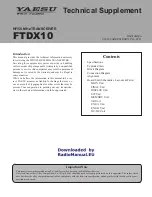
Introductory information
7
En
English
02
Chapter 2
Introductory information
Introduction to home theater
You are probably used to using stereo equipment to listen
to music, but may not be used to home theater systems
that give you many more options (such as surround
sound) when listening to soundtracks.
Home theater refers to the use of multiple audio tracks to
create a surround sound effect, making you feel like
you're in the middle of the action or concert. The
surround sound you get from a home theater system
depends not only on the speakers you have set up in your
room, but also on the source and the sound settings of
the receiver.
DVD-Video has become the basic source material for
home theater due to its size, quality, and ease of use. The
true multichannel audio possible using DVD is what
creates a convincing surround sound effect and gives
you the feeling of ‘being there’.
Features
Dolby Digital and DTS decoding, including Dolby
Digital EX, DTS 96/24 and DTS-ES
(pages 27, 46, 47)
Dolby Digital and DTS decoding brings theater sound
right into your home with up to six channels of surround
sound, including a special LFE (Low Frequency Effects)
channel for deep, realistic sound effects.
With the addition of a surround back speaker, you can
take advantage of the built-in Dolby Digital EX and DTS-
ES decoders for seven channel surround sound.
Multichannel analog inputs
(page 10)
The addition of multichannel analog inputs means total
compatibility with DVD-Audio and other high-resolution
formats, as well as giving you the option of using an
external decoder for Dolby Digital and DTS sources.
Dolby Pro Logic IIx and DTS Neo:6 decoders
(pages 27, 46, 47)
The built-in Dolby Pro Logic IIx and DTS Neo:6 decoders
not only provide full surround sound decoding for Dolby
Surround sources, but will also generate convincing
surround sound for any stereo source.
SR+ operation with Pioneer plasma displays
(page 18)
If you have a Pioneer plasma display you can take
advantage of the SR+ features, such as automatic input
switching with the receiver and on-screen displays for
receiver information.
Surround and Advanced Surround modes
(pages 27, 28)
Used together with the Dolby Digital, DTS or Dolby Pro
Logic IIx modes, the Surround and Advanced Surround
modes are designed to enhance particular types of
program material by, for example, reproducing the
acoustic space of a concert hall for music-based
material.
Dialog Enhancement
(page 28)
Use the Dialog Enhancement feature to accentuate
dialog and vocals in a program source and match the
vertical placement of the center channel with the front
left/right channels.
Sound Modes
(page 28)
The Sound Modes offer useful effects for a number of
situations. For example, Midnight mode is useful when
you need to listen at low volume but still want effective
surround sound.
Easy-to-use remote control
The remote control gives you not only complete control
over every function of this receiver, but also over other
components in your home theater system. Using a
system of preset codes, you can program the remote to
operate a wide range of other equipment.
Easy setup
(page 24)
Setting up for home theater sound is as easy as
connecting your speakers, a DVD player or other source,
and your TV. The MCACC (Multichannel Acoustic
Calibration) system quick but accurate surround sound
setup, while for complete surround sound control you
still have access to the full range of surround sound
settings.
The Energy-saving Design
This unit is designed to use less than 0.4 W of energy
when the receiver is in standby mode.
Manufactured under license from Dolby Laboratories.
“Dolby”, “Pro Logic”, “Surround EX” and the double-D
symbol are trademarks of Dolby Laboratories.
“DTS”, “DTS-ES Extended Surround”, “Neo:6” and “DTS 96/
24“ are trademarks of Digital Theater Systems, Inc.
vsx-c501(WY).book 7 ページ 2004年5月28日 金曜日 午後3時19分








































